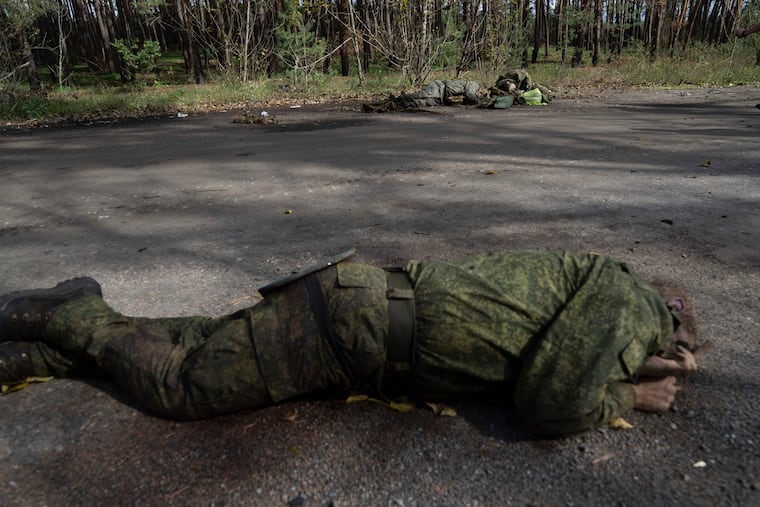Retreating Russians leave their comrades’ bodies behind
Russian troops abandoned a key Ukrainian city so rapidly that they left the bodies of their comrades in the streets.

LYMAN, Ukraine — Russian troops abandoned a key Ukrainian city so rapidly that they left the bodies of their comrades in the streets, offering more evidence Tuesday of Moscow’s latest military defeat as it struggles to hang on to four regions of Ukraine that it illegally annexed last week.
Meanwhile, Russia’s upper house of parliament rubber-stamped the annexations following “referendums” that Ukraine and its Western allies have dismissed as fraudulent.
Responding to the move, Ukrainian President Volodymyr Zelenskyy formally ruled out talks with Russia, declaring that negotiations with Russian President Vladimir Putin are impossible after his decision to take over the regions.
The Kremlin replied by saying that it will wait for Ukraine to agree to sit down for talks, noting that it may not happen until a new Ukrainian president takes office.
“We will wait for the incumbent president to change his position or wait for a future Ukrainian president who would revise his stand in the interests of the Ukrainian people,” Kremlin spokesman Dmitry Peskov said.
» READ MORE: Ukraine claws back more territory that Russia is trying to annex
Despite the Kremlin’s apparent political bravado, the picture on the ground underscored the disarray Putin faces amid the Ukrainian advances and attempts to establish new Russian borders.
Over the weekend, Russian troops pulled back from Lyman, a strategic eastern town that the Russians had used as a logistics and transport hub, to avoid being encircled by Ukrainian forces. The town’s liberation gave Ukraine an important vantage point for pressing its offensive deeper into Russian-held territories.
Two days later, an Associated Press team reporting from Lyman saw at least 18 bodies of Russian soldiers still on the ground. The Ukrainian military appeared to have collected the bodies of their comrades after fierce battles for control of the town, but they did not immediately remove those of the Russians.
“We fight for our land, for our children, so that our people can live better, but all this comes at a very high price,” said a Ukrainian soldier who goes by the nom de guerre Rud.
Speaking late Tuesday in his nightly video address, Zelenskyy said dozens of settlements had been retaken “from the Russian pseudo-referendum this week alone” in the four annexed regions. In the Kherson region, he listed eight villages that Ukrainian forces reclaimed, “and this is far from a complete list. Our soldiers do not stop.”
The deputy head of the Russian-backed regional administration in Kherson, Kirill Stremousov, told Russian TV that Ukrainian troops made “certain advances” from the north, and were attacking the region from other sides too. He said they were stopped by Russian forces and suffered high losses.
As Kyiv pressed its counteroffensives, Russian forces launched more missile strikes at Ukrainian cities.
Several missiles hit Ukraine’s second-largest city, Kharkiv, damaging infrastructure and causing power cuts. Kharkiv Gov. Oleh Syniehubov said one person was killed. In the south, Russian missiles struck the city of Nikopol.
After reclaiming control of Lyman in the Donetsk region, Ukrainian forces pushed further east and may have gone as far as the border of the neighboring Luhansk region as they advanced toward Kreminna, the Washington-based Institute for the Study of War said in its latest analysis.
On Monday, Ukrainian forces also scored significant gains in the south, raising flags over the villages of Arkhanhelske, Myroliubivka, Khreshchenivka, Mykhalivka and Novovorontsovka.
In Washington, the U.S. government announced Tuesday that it would give Ukraine an additional $625 million in military aid, including more of the High Mobility Artillery Rocket Systems, or HIMARS, that are credited with helping Kyiv’s recent military momentum. The package also includes artillery systems ammunition and armored vehicles.
Before that announcement, Ukrainian Deputy Foreign Minister Yevhen Perebyinis told a conference in the Turkish capital, Ankara, on Tuesday that Ukraine needed more weapons since Russia began a partial mobilization of draft-age men last month. He said additional weapons would help end the war sooner, not escalate it.
Russian Defense Minister Sergei Shoigu said the military has recruited more than 200,000 reservists as part of the partial mobilization launched two weeks ago. He said the recruits were undergoing training at 80 firing ranges before being deployed to the front lines in Ukraine.
» READ MORE: Ukraine presses on with counteroffensive; Russia uses drones
Putin’s mobilization order said that up to 300,000 reservists were to be called up, but it held the door open for an even bigger activation. The order sparked protests across Russia and drove tens of thousands of men to flee the country.
Russia’s effort to incorporate the four embattled regions in Ukraine’s east and south was done so hastily that even the exact borders of the territories being absorbed were unclear.
The upper house of the Russian parliament, the Federation Council, voted to ratify treaties to make the eastern Donetsk and Luhansk and the southern Kherson and Zaporizhzhia regions part of Russia. The lower house did so Monday.
Putin is expected to quickly endorse the annexation treaties.
In other developments, the head of the company operating Europe’s largest nuclear plant said Ukraine is considering restarting the Russian-occupied facility to ensure its safety as winter approaches.
In an interview with The Associated Press on Tuesday, Energoatom President Petro Kotin said the company could restart two of the Zaporizhzhia Nuclear Power Plant’s reactors in a matter of days.
“If you have low temperature, you will just freeze everything inside. The safety equipment will be damaged,” he said.
Fears that the war in Ukraine could cause a radiation leak at the Zaporizhzhia plant had prompted the shutdown of its remaining reactors. The plant has been damaged by shelling, prompting international alarm over the potential for a disaster.